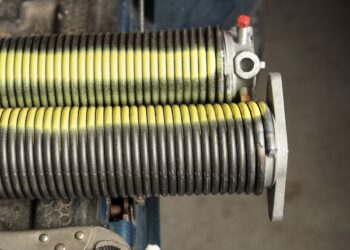Garage Door Springs: What You Need to Know
Garage doors are heavy, and the component that makes them easy to open and close is the garage door spring system. Whether you have torsion springs or extension springs, these tightly wound coils provide the counterbalance needed to safely lift and lower your door. Understanding the types, functions, and maintenance needs of garage door springs can help you spot issues early and extend their lifespan.
Types of Garage Door Springs
Torsion Springs
Torsion springs are mounted above the garage door, parallel to the door opening. They use torque (rotational force) to balance the door’s weight, making lifting smooth and controlled. Torsion springs are durable, safer under tension, and generally last longer than extension springs. Many modern garage doors use torsion springs for their reliability and performance.
Extension Springs
Extension springs are mounted on either side of the garage door tracks. They expand and contract as the door opens and closes. While extension springs are effective and often more affordable, they typically have a shorter lifespan and may be more prone to wear-and-tear issues. Safety cables are crucial with extension springs to prevent damage if a spring snaps.
The Function of Garage Door Springs

Garage door springs carry most of the weight of your door. Without them, lifting a door that weighs over 150 pounds would be nearly impossible. By counterbalancing the door’s weight, springs reduce the strain on your garage door opener, extending the life of your entire system. Properly working springs ensure smooth operation, prevent jerking motions, and help avoid accidents.
Average Lifespan of Garage Door Springs
The lifespan of garage door springs depends on their type and usage:
- Torsion springs: 15,000 to 20,000 cycles (roughly 7–12 years with average use)
- Extension springs: 10,000 cycles (about 5–8 years with average use)
Frequent use, poor maintenance, or extreme weather conditions can shorten their lifespan.
Signs Your Garage Door Springs Are Worn or Failing
Knowing when your garage door springs need attention can help you avoid sudden breakdowns or dangerous failures. Common signs include:
- The garage door feels heavy or difficult to lift manually
- The door opens unevenly or jerks while moving
- Loud squeaking or grinding noises during operation
- The door closes too quickly or slams shut
- Visible gaps, rust, or stretched coils in the springs
If you notice any of these signs, it’s time to call a professional garage door repair service. Attempting DIY spring repairs can be dangerous due to the high tension these parts hold.
Maintenance Tips for Garage Door Springs
While spring replacement should always be handled by professionals, there are a few maintenance steps homeowners can take to keep springs in good shape:
- Lubricate moving parts: Apply a garage door lubricant to the springs and other moving components every 3–4 months.
- Check for balance: Test the door’s balance by disconnecting the opener and manually lifting the door halfway. If it doesn’t stay in place, the springs may be worn.
- Inspect visually: Look for rust, corrosion, or gaps in the coils.
- Schedule annual inspections: Having a professional garage door technician inspect your system each year can extend the lifespan of your springs and prevent costly repairs.
Why Professional Garage Door Spring Repair Is Essential
Garage door spring replacement is not a DIY project. Springs are under extreme tension, and mishandling them can cause serious injury or property damage. A licensed garage door repair technician has the tools and expertise to safely replace or adjust springs, ensuring your door works properly and safely.
Expert Garage Door Spring Service in Vancouver, WA
At All About Doors, we specialize in professional garage door spring repair and replacement for homeowners in Vancouver, WA, and surrounding areas. Our team ensures your garage door operates safely, smoothly, and reliably. If you suspect spring issues, don’t wait; contact us today for expert garage door service you can trust.


